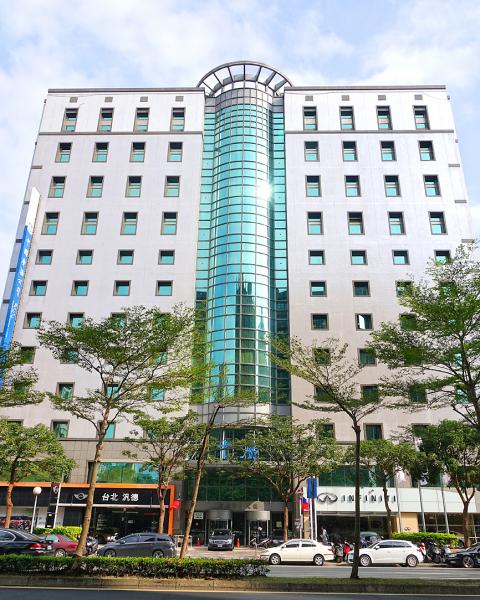The Chinese Nationalist Party (KMT) made NT$7.6 billion (US$238.07 million) by selling the Broadcasting Corp of China (BCC, 中廣), the nation’s largest radio operator, but the party could be asked to return the proceeds to the state, the Ill-gotten Party Assets Settlement Committee said yesterday.
The committee combed through a complex transaction history of the BCC spanning more than a decade involving transfer of equity and capital reduction and found that the KMT made about NT$7.6 billion by selling the radio operator, committee spokeswoman Shih Chin-fang (施錦芳) said.
The BCC, founded in 1928 as a broadcasting unit within the KMT, took over Japanese broadcasting facilities and equipment after World War II, and the the KMT held the BCC via party-owned Hua Hsia Investment Holding Co (華夏投資公司).

Photo: Chang Chia-ming, Taipei Times
In 2005, the KMT transferred the equity of Hua Hsia Investment to other two party-owned companies — Central Investment Co (中央投資公司) and Kuanghua Securities Investment and Trust Co (光華證券投信) — and received NT$3.82 billion.
In 2006, Hua Hsia Investment sold the BCC, including its frequencies and buildings, to BCC chairman Jaw Shaw-kong (趙少康) and four radio operators for NT$5.7 billion. However, Jaw and other buyers paid only NT$1 billion to acquire the BCC’s broadcasting facilities, but not its buildings.
The BCC later transferred its real-estate holdings — worth about NT$5.6 billion — to Kuanghua Co amid lawsuits launched by the government against the company over controversial properties the BCC appropriated from the Japanese.
Central Investment Co later acquired Kuanghua Co and transferred the BCC real-estate holdings to Hsinyutai Co (欣裕台股份有限公司, a spin-off of Central Investment Co.
In 2012, Kuanghua reduced its capital by NT$800 million and redistributed the money to Hsinyutai, which in turn transferred the money to its sole shareholder, the KMT.
Hsinyutai in 2013 reduced its capital by NT$2 billion and redistributed the money to the KMT.
Last year, Hsinyutai sold its holdings in Kuanghua to another company, Hsinkuanghua Co (欣光華), for NT$3 billion, which later reduced its capital by NT$2.9 billion and redistributed it the KMT.
“In the preparatory hearing on Friday [today], we have to understand whether the BCC and Central Motion Picture Corp (CMPC, 中央電影公司) were directly controlled by the KMT to determine whether they were KMT-affiliated organizations,” Shih said.
KMT Culture and Communications Committee deputy director Hu Wen-chi (胡文琦) said all the data revealed by Shih were investigated by prosecutors during former president Chen Shiu-bian’s (陳水扁) administration and no evidence of illegal activity between the BCC and the KMT was found.
The BCC has already returned controversial properties to the government, including those in Changhua and Hualien counties, as well as New Taipei City’s Banciao (板橋) and Bali (八里) districts, Hu said.
He called on the Ill-gotten Party Assets Settlement Committee to investigate former president Lee Teng-hui (李登輝), former KMT treasurer Liu Tai-ying (劉泰英) and People First Party Chairman James Soong (宋楚瑜), who Hu said were involved in the BCC’s financial management and investments, but were not included in the investigations.

Intelligence agents have recorded 510,000 instances of “controversial information” being spread online by the Chinese Communist Party (CCP) so far this year, the National Security Bureau (NSB) said in a report yesterday, as it warned of artificial intelligence (AI) being employed to generate destabilizing misinformation. The bureau submitted a written report to the Legislative Yuan in preparation for National Security Bureau Director-General Tsai Ming-yen’s (蔡明彥) appearance before the Foreign Affairs and National Defense Committee today. The CCP has been using cognitive warfare to divide Taiwanese society by commenting on controversial issues such as Taiwan Semiconductor Manufacturing Co’s (TSMC, 台積電) investments in the

HELPING HAND: The steering committee of the National Stabilization Fund is expected to hold a meeting to discuss how and when to utilize the fund to help buffer the sell-off The TAIEX plunged 2,065.87 points, or 9.7 percent, to close at 19,232.35 yesterday, the highest single-day percentage loss on record, as investors braced for US President Donald Trump’s tariffs after an extended holiday weekend. Amid the pessimistic atmosphere, 945 listed companies led by large-cap stocks — including Taiwan Semiconductor Manufacturing Co (TSMC, 台積電), Hon Hai Precision Industry Co (鴻海精密) and Largan Precision Co (大立光) — fell by the daily maximum of 10 percent at the close, Taiwan Stock Exchange data showed. The number of listed companies ending limit-down set a new record, the exchange said. The TAIEX plunged by daily maxiumu in just

INVESTIGATION: The case is the latest instance of a DPP figure being implicated in an espionage network accused of allegedly leaking information to Chinese intelligence Democratic Progressive Party (DPP) member Ho Jen-chieh (何仁傑) was detained and held incommunicado yesterday on suspicion of spying for China during his tenure as assistant to then-minister of foreign affairs Joseph Wu (吳釗燮). The Taipei District Prosecutors’ Office said Ho was implicated during its investigation into alleged spying activities by former Presidential Office consultant Wu Shang-yu (吳尚雨). Prosecutors said there is reason to believe Ho breached the National Security Act (國家安全法) by leaking classified Ministry of Foreign Affairs information to Chinese intelligence. Following interrogation, prosecutors petitioned the Taipei District Court to detain Ho, citing concerns over potential collusion or tampering of evidence. The

‘COMPREHENSIVE PLAN’: Lin Chia-lung said that the government was ready to talk about a variety of issues, including investment in and purchases from the US The National Stabilization Fund (NSF) yesterday announced that it would step in to staunch stock market losses for the ninth time in the nation’s history. An NSF board meeting, originally scheduled for Monday next week, was moved to yesterday after stocks plummeted in the wake of US President Donald Trump’s announcement of 32 percent tariffs on Taiwan on Wednesday last week. Board members voted to support the stock market with the NT$500 billion (US$15.15 billion) fund, with injections of funds to begin as soon as today. The NSF in 2000 injected NT$120 billion to stabilize stocks, the most ever. The lowest amount it